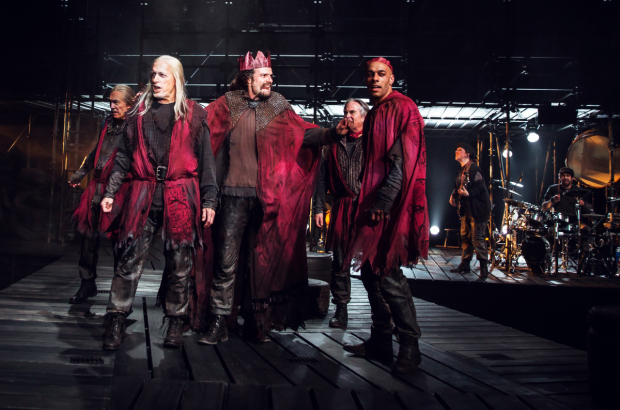Tug of War: Foreign Fire
Chicago Shakespeare Theater presents a marathon showing of the Hundred Years’ Wars.

(© Liz Lauren)
Despite prevailing wisdom that our attention spans are waning in this digital age, theatrical binge-watching has become very fashionable in the last several years. People watch medieval intrigue for hours at a time on Game of Thrones, so why not at the theater? Some Chicago venues have found great success with the format, notably the House Theatre of Chicago’s Hammer Trinity and the Hypocrites’ All Our Tragic.
Tug of War: Foreign Fire is artistic director Barbara Gaines’ ambitious foray into the trend of the theatrical marathon, taking nearly six hours to present Shakespeare’s Edward III, Henry V, and Henry VI, Part 1, in a new adaptation by Gaines that thoroughly condemns war in general, while linking the conflicts of the 14th and 15th centuries with those of the 21st.
Gaines’ antiwar sentiment is not employed by highlighting the cruelty and barbarism of battle, but rather by reducing it to something childish. Kings wear paper crowns, fighting over a golden tire swing like little boys scrabbling over playground space. In five and a half hours of war, not a single sword is drawn. Matt Hawkins’ fight choreography is wonderfully visceral, but it is limited to fisticuffs. Upstage, a youthful four-piece rock band is always present, playing songs that span generations of conflict, from "When Johnny Comes Marching Home" to Leonard Cohen’s driving "There Is a War."
The inclusion of Edward III is curious, as its provenance as a work of Shakespeare is widely debated. Foreign Fire begins with King Edward III (a louche and appealing Freddie Stevenson) pressing his matrilineal claim to the French throne. Edward is an inspiring leader but a lecherous lover, pursuing the virtuous Countess of Salisbury (Karen Aldridge, in a noble performance) before turning his attention to conquest.
Edward is victorious, but Foreign Fire never lets a king rest on his laurels. The audience is immediately plunged into the reign of Edward’s great-grandson, Henry V (John Tufts, who makes the most of the rousing role). The cycle begins again, as King Henry must reclaim France, this time with the backing of the Church. Soldiers fight and die, England prevails, Henry marries into the French royal line.
Then we jump ahead to Henry's untimely death and the crowning of his easily influenced young heir, Henry VI (Steven Sutcliffe). England loses control of France, of course, and young Henry VI is urged to reclaim the French throne, of course. By the third time around, much of the thrill has been lost. Excellent performances by Heidi Kettenring as French firebrand Joan la Pucelle and James Newcomb as English stalwart Lord Talbot buoy an otherwise-tedious slog through the battlefield.
It is no fault of the production team or cast that the show loses its momentum so completely. Each individual aspect is well-done, from the casting by Gaines and casting director Bob Mason, to Lindsay Jones’ dynamic sound design and musical arrangements. The ensemble of 19 actors fills Scott Davis’ set of bare wooden planks backed by three stories of scaffolding. Lighting designer Anthony Pearson lights the stage to great advantage, whether seeping hellish red lights from below the set, or filling the space with blinding brightness at the height of battle.
While the parade of factions through the generations could be confusing for the unfamiliar viewer, Susan E. Mickey provides helpful color coordination in her costume design, cloaking the English in crimson and the French in blue. The kings even have their portraits, names and titles on their cloaks, though those details may be lost to audience members sitting in the balconies.
The whole production, however, never lives up to the sum of its parts. The apparent thesis of this adaptation is that war is an endless repetitive cycle. As true as that may be, an endless repetitive cycle is simply not an appealing premise for a binge-watch. In the fall, Chicago Shakespeare will present Tug of War: Civil Strife, which will similarly combine Henry VI, Parts 2 and 3 and Richard III and continue the story of the Plantagenets through the War of the Roses. Perhaps it will find the forward momentum that Tug of War: Foreign Fire lost along the way.











